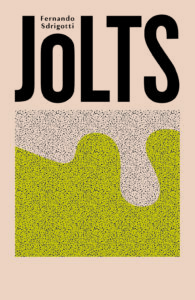
[Influx Press; 2020]
Fernando Sdrigotti’s Jolts is a book of nine stories about living away from home, leaving home, forgetting home, laughing at and within newfound homes. The book is also a masterclass in the short story form. Each story is at once experimental in form and earnest in feeling.
The idea of “writing home” is an obsession of mine and has been for a long while. Yet it wasn’t the subject matter that first drew me into Sdrigotti’s literary world, but rather the rhythm of the prose, the uproarious laughter at the everyday, and then, every few pages, a breath in, a pause, the colloquial made beautiful.
In the opening story, “Jolts,” I underlined this sentence, in which “it” refers to a gun: “We throw it as far as we can, hoping it will sink into the canal that used to carry the big transatlantic cargos before the ships stopped coming and everyone started to talk about leaving.” Something about this sentence captured me, reminded me of the port city of my own youth, of guns and boys and that moment right before our lives begin.
This opening story, told in vignettes that jump around from Argentina to the UK, from 1986 to 2014, places the reader in the ways of this book and introduces the hero: a scrappy writer who serves as a sort of alter ego to the author himself. We are told how this guy writes, what he does and does not like:
The editors do not appreciate your jolts in time. Everything about that statement makes him sick: the academic snobbery of avoiding contractions, the passive aggressive “appreciate” instead of right-out “hate,” their use of the third person plural. Who are the editors? Why don’t they appreciate the jolts in time? How do they live lives without jolts?
Sdrigotti, born in 1977 in Rosario, tells personal stories about a collective experience: leaving home in search of something a bit better. Jolts gives us glimpses of the generation of Argentines who left behind the financial devastation and political instability of the late 90s and early aughts and immigrated to Europe. Often this immigration was the result of having European roots — grandparents — who made it possible to apply for Italian or Spanish passports. An arrival, a return. Just one migratory wave of many. A shift in directions in less than a century. A jolt to the system, a change in preconceived notions about time, progress, wealth.
That shiny eurozone Europe — unified, booming, almost brand spanking new — of course no longer exists. That free-market fever dream didn’t last twenty years. And in Jolts we get the post-Brexit UK through this writer’s eyes as well. But first we have some fun. In a story such as “Ceci n’est Pas Un Mémoire” we get the rush, all the possibility of the early aughts:
Maybe deep inside I knew well I was fooling myself. But I didn’t want to think too much about it, so first I’m going to Dublin and I’ll get a job, anything, I’m not fussy. Maybe as a tour guide, or in a museum, or as an interpreter, somewhere, anything along those lines — Fred can help me. Because they need people in the tourist industry, people who can speak English, yes, but also other languages, and no one asks too many questions about your papers as long as you work hard.
“Only Up Here” and “Turkish Delight” also explore those fast times in the eurozone when our narrator (he’s always a Fernando Sdrigotti-like figure in this book) did lots of drugs in London. This character is always shy, but hilarious, slightly awkward and nervous, but smiling, laughing inside, it seems. In “Only Up Here” we get this wonderful, wacky description of watching a football match in George’s Kebab:
Soon I’m sitting in the back room, accidently watching Newell’s Old Boys, my team from Argentina, playing a shitty football game; the commentary is in Turkish — it’s all very strange. Eleven thousand one hundred and forty-six kilometers away, I’m watching twenty-two idiots with a ball in real time. With three or four seconds delay, perhaps, but live. It’s mind boggling. From Rosaria and across the Atlantic, over the Ural mountains, BANG!, Istanbul, then picked up by a Soviet satellite who-knows-how-many-kilometers above the atmosphere and BANG! (again) on the telly before me — he just smiles blankly and then goes back to his paper. I shut up and eat my kebab.
“Turkish Delight” continues with the same fast-paced, hyperactive tone:
Turkish Delight goes really well with Sunday afternoons. We should go, get some more, and then hit the road, have something to drink down Portobello Road, hit the record shops, stop here and there to top up every half an hour or so, and then come back home, listen to a few records and maybe call a couple of whores in to finish the weekend with full colors!
“Methylated Spirits” is a delightfully funny, claustrophobic account of that special level of hell that is a crowded Sainsbury’s supermarket at 4:30 pm on Christmas Eve. This story actually made me laugh out loud and works simultaneously as satire and despair about both the UK and late-stage capitalism in general.
Lately I have read a few story collections that felt piecemeal, put together over many years, after too many workshops, and with too much advice and input from too many different people. This book however reads like a true collection; the stories coalesce into a complete portrait of the writer. The stories are related (I’m afraid to use the overused term “linked”) in a way that feels organic and complete, almost as if we’re reading a novel in stories. The narrator is usually this shy, oftentimes confused Argentinian abroad, but the reflections change from social commentary on the ignorance and xenophobia of the English, to deeper explorations of interiority.
The fact that each and every ending of these stories feels exactly right is quite miraculous. It’s been years since I’ve read nine stories in a row that nail each landing. If a short story is a weekend or one wild night and a novel is an entire year, Jolts plays with different ways to spend a Saturday night and each one feels as if it’s timed just right. He’s been writing, and reading, stories for many years and his love for the form shows.
What is most singular and almost touching about Sdrigotti’s method is his ability to combine wry exaggeration and parody with much tenderness in a story like “Barbecue And Exhumation In Victoria Park Village.” I felt pangs of recognition when the narrator has to repeat several times that he has lived in London for fifteen years, but the English still question his ability to understand their conversations. There is a loneliness, that voice of the outsider, of the creative kid, of the misfit, of the writer, that haunts every joke, every line etched to make the reader laugh. The view from the periphery makes the book earnest, engaging, and also vulnerable.
If the first half of this collection is down and dirty, fast-paced — all about being young in the city — the final two stories, “Something about this Summer and the Summer Last Year,” and “Notes Toward a Return” are about entire lifetimes, about childhood and adulthood, departure and returns. These two stories are sadder than the Londontown capers, but they include some of my favorite passages. Here the prose is spare, honest. Sdrigotti’s nuanced exploration of home — of belonging and unbelonging — explains just how a person “abroad” might invent stories, memories, different pasts, other places, whole new lies and lives:
Because the thing is: I never lived in Buenos Aires. I frequented Buenos Aires a lot, but I never managed to settle there, had my name on a bill, or a fixed abode, or a favorite café that wasn’t a cliché, or a library card. Unlike Dublin, Paris, and later London, Buenos Aires was too much for me — I couldn’t tame it, own it, call it my own [. . .] So I miss the possibility of Buenos Aires. And by missing its possibility I can miss my own hometown without the uncomfortable bits, without all the impossibilities, the proximities, the complexities and familiarities. The parts that can hurt.
We see the ways in which, once untethered, displaced, uprooted, one might start imagining things, inventing stories — in-between oceans and languages and communities — living in the abrupt shocks, recording the jolts in time.
Madeline Beach Carey is the author of the story collection Les filles dels altres. Her work has appeared, or is forthcoming, in El Món d’Ahir, de/rail, RIC Journal, The Sultan’s Seal, The Momentist, Southword, and elsewhere. Carey has been the recipient of award and fellowships from the Bread Loaf Writers’ Conference, the Edward Albee Foundation, Faber Residency, Hawthornden Castle, Greywood Arts, and Ventspils House. She teaches at the Irish Writers Centre and privately.
This post may contain affiliate links.







